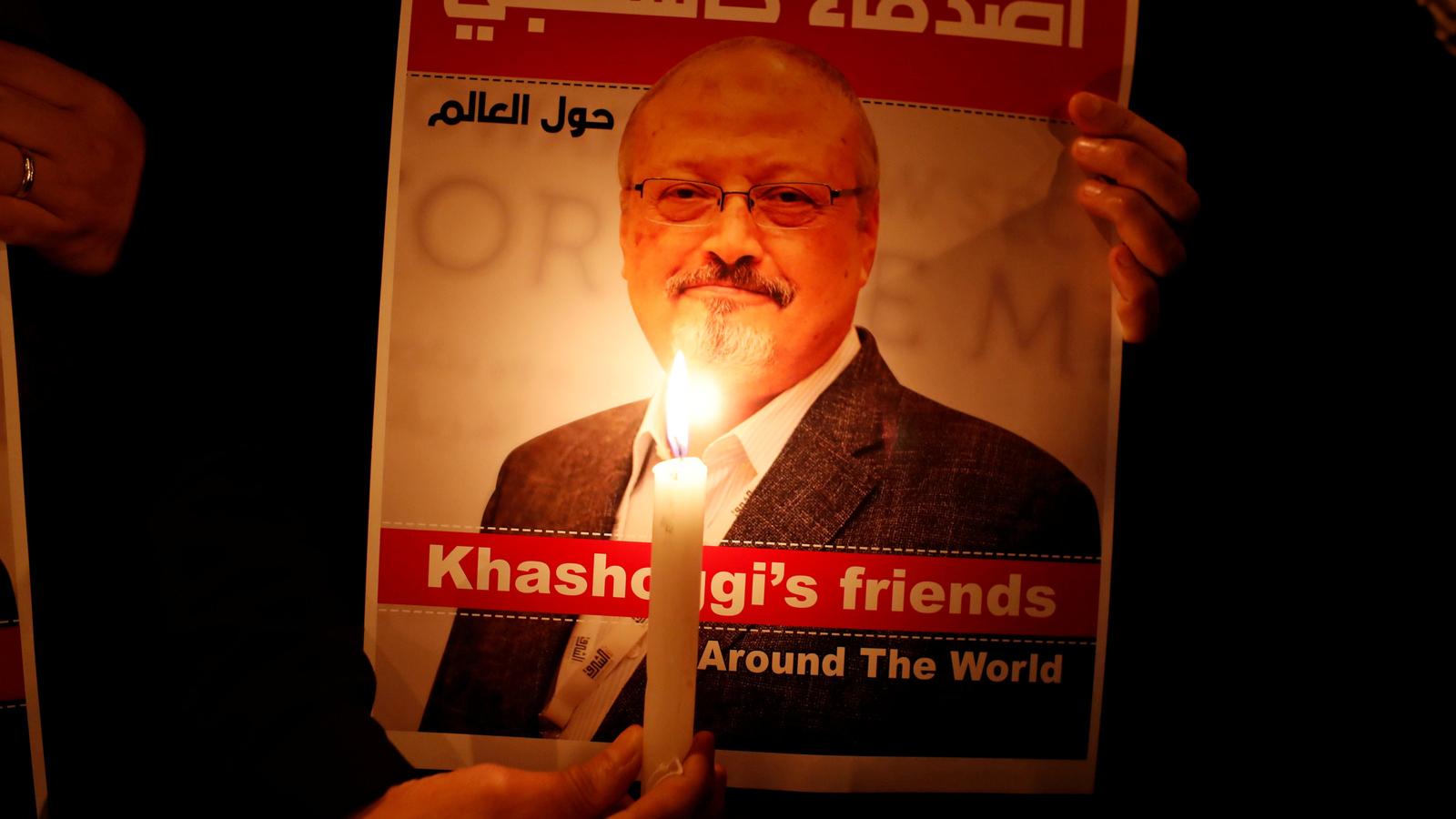US slaps sanctions on 17 Saudis over Jamal Khashoggi killing, but not the Riyadh government
A demonstrator holds a poster with a picture of Saudi journalist Jamal Khashoggi outside the Saudi Arabia consulate in Istanbul, Turkey, Oct. 25, 2018.
The US Treasury imposed sanctions on 17 Saudi officials on Thursday for their role in the killing last month of Jamal Khashoggi at the Saudi Arabian consulate in Istanbul, Turkey — the first concrete response by the Trump administration to the journalist’s death.
Among those sanctioned were Saud al-Qahtani, who has been removed from his position as a top aide to Crown Prince Mohammed bin Salman, as well as the Saudi Consul General Mohammed Alotaibi and members of a 15-person team Turkey has identified as being involved in Khashoggi’s death.
Related: Saudi Arabia’s gathering storm over its erratic crown prince
The announcement was unusual for Washington, which rarely imposes sanctions on Saudi nationals. The sanctions do not target the Riyadh government, an important US economic and security ally.
It also allows President Donald Trump’s administration to stop short of any action that might affect lucrative US arms deals with Saudi Arabia that he has vowed to preserve.
The sanctions limit access to the US financial system and freeze the individuals’ assets. They will be implemented under the Global Magnitsky Human Rights Accountability Act, which targets the perpetrators of serious human rights abuses and corruption.
“These individuals who targeted and brutally killed a journalist who resided and worked in the United States must face consequences for their actions,” Treasury Secretary Steve Mnuchin said in a statement.
Related: Trump says Saudis staged ‘worst cover-up ever’ on Khashoggi; US revokes visas of some Saudis
“The government of Saudi Arabia must take appropriate steps to end any targeting of political dissidents or journalists,” Mnuchin said.
US Secretary of State Mike Pompeo called Thursday’s announcement “an important step” in the response to Khashoggi’s killing and said his department would continue to seek facts, consult the US Congress and work with other countries to hold accountable anyone who was involved.
Turkey identified many of those sanctioned
Among others cited in Thursday’s announcement are Maher Mutreb, an aide to Qahtani who has appeared in photographs with Prince Mohammed on official visits this year to the United States and Europe.
He and 14 others were members of the team Turkey identified as being responsible for killing Khashoggi.
Related: Saudi suspected of organizing killing of Khashoggi has close ties the crown prince
Absent from the sanctions list were four officials fired last month along with Qahtani: General Ahmed Asiri, the deputy head of foreign intelligence, and three other intelligence deputies — General Rashad bin Hamed al-Hamadi, director of the general directorate of security and protection, General Abdullah bin Khaleef al-Shaya, assistant head for human resources, and General Mohammed Saleh al-Ramih, assistant head for intelligence affairs.
Treasury did not immediately respond to a request for an explanation of why they were not included.
The US sanctions were announced a few hours after Saudi Arabia’s public prosecutor said the death penalty was being sought for five out of 11 suspects charged in Khashoggi’s murder, as the kingdom tries to contain its biggest political crisis in a generation.
Khashoggi, a royal insider-turned-critic of Saudi policy, was killed in the Saudi consulate in Istanbul on Oct. 2 after a struggle, by lethal injection, deputy public prosecutor and spokesman Shalaan al-Shalaan told reporters.
Shalaan said Prince Salman knew nothing of the operation, in which Khashoggi’s body was dismembered, removed from the building and handed over to an unidentified “local cooperator.”
Related: Trump reluctant to abandon Riyadh over missing journalist, wants evidence
In contrast to Thursday’s announcement, the US government never imposed sanctions on Saudi officials over the Sept. 11, 2001, attacks, in which 15 of the 19 hijackers were from the kingdom.
A US government commission found no evidence that Saudi Arabia directly funded al Qaeda, which carried out the attacks on New York and Washington. The panel, however, left open whether individual Saudi officials might have.
Our coverage reaches millions each week, but only a small fraction of listeners contribute to sustain our program. We still need 224 more people to donate $100 or $10/monthly to unlock our $67,000 match. Will you help us get there today?
